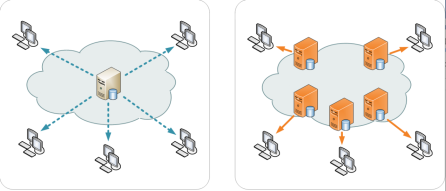 By Sebastian Stock
By Sebastian Stock
In Akamai Technologies, Inc. v. Limelight Networks, the Federal Circuit broadened potential patent infringement claims by no longer requiring a defendant perform all the steps of a patented method before direct infringement occurs. As the dust settles from Akamai, should courts expect an influx of patent infringement suits.
Akamai Technologies, Inc. began in 2006 when Akamai Technologies, Inc. (“Akamai”) sued Limelight Networks, Inc. (“Limelight”), claiming infringement of claims on its patent related to its content delivery network (“CDN”). A CDN is a platform of proxy servers designed to directly deliver end-user internet content. CDN’s are widely used – they carry nearly half of the world’s internet traffic.
 By Toban Platt
By Toban Platt By Gwen Wei
By Gwen Wei By Gwen Wei
By Gwen Wei By: Samuel Daheim
By: Samuel Daheim